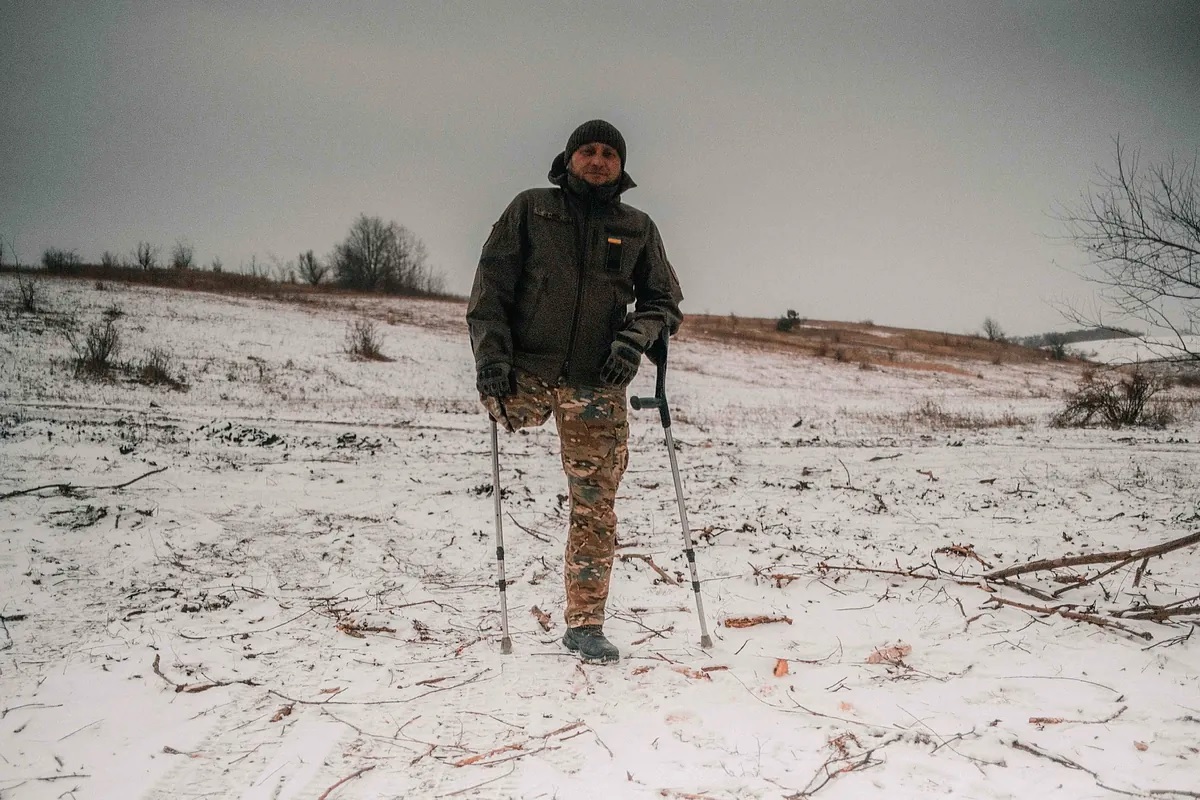Leonid is determined to prove that he is not a fraud. "Come on, I'll take you back," he says convincingly. He is so insistent that the owner of a military van has to leave him the keys without being able to protest. We climb alongside him, not in the back seats, so we can see how he is able to drive any four-wheeled vehicle with just one leg. With only his left leg, jumping from pedal to pedal, he drives smoothly even on an icy road.
This soldier lost his leg due to a 12.7-millimeter caliber bullet impact, a large projectile used by Russian snipers. It took him a long time to recover and even left the army for a while. Until he got fed up and realized that the only thing he was good at was mechanics and driving. But there was another reason: "Our enemy is still here and never rests. Why would I rest?".
Leonid was responsible for checking the mechanics of all the armored vehicles that Ukraine confiscated from the Russians during the fall 2022 Kharkiv counteroffensive, with over 500 armored vehicles suddenly incorporated into the Kiev army. "I know the interior of Soviet-origin tanks very well, and in fact, I have spent a lot of time driving T72 tanks," he says.
War-mutilated soldiers who have chosen to continue fighting for Ukraine. / lt;HIT gt;ALBERTO lt;/HIT gt; lt;HIT gt;ROJAS lt;/HIT gt;WORLD
After three years of war, encountering war mutilated individuals is common in Ukraine. But what stands out is that many continue to wear the army uniform and their unit patches. It is not a whim or a trend. The reality is that they continue to serve voluntarily, as the severity of their injuries guarantees them a recovery period and the option to resign from service if they request it. Of the approximately 300,000 wounded left by the invasion, roughly half continue to fight, sometimes on the front lines, as long as their injuries allow it, or sometimes in logistics or administrative tasks.
Captain Oleksandr Puzikov lost his arm in the early days of the invasion due to shrapnel. He was on all possible waiting lists to get a decent prosthesis, but all the ones he tried turned out to be like having a wooden arm. Although he could have resigned from his officer position due to the mutilation, he chose to continue:
- Why do you continue to serve in your unit?
- Have you seen our enemy leave Ukraine?
- No
- Then there is work to be done.
Oleksandr always carries his Soviet-era pistol, although he is not currently deployed on the front line but is dedicated to training other soldiers.
Dmytro, a sergeant in an assault unit, lost an eye due to shrapnel in his left eye. He underwent several operations to remove metal fragments from his body, but some, too small, still remain. "It's curious because my body slowly expels them, pushes them out until they are close to the skin, and with a slight incision, I can remove them," he shows his arms, full of small scars. "I could never pass through an airport security arch without setting off all the alarms," he comments.
Dmytro keeps his weapon, bulletproof vest, and helmet, as he has requested to return to the combat unit he once led. In his command post, he has a patch belonging to a Wagner group mercenary and another from a Russian soldier dedicated to Putin that reads "We fight for Uncle Vova". "I thought about quitting when I was injured, and my family almost succeeded, but the job here is not finished, so I can't leave my comrades like this. Some have not been injured as much as I have, but they have other severe physical problems and are still here fighting."
- What do you think of young people who prefer to desert rather than join the army?
- It's close to treason because no one wants this life we lead of sleeping in basements and risking our lives, but some respond, and others don't.
However, war injury mutilation represents a shock moment in the lives of others that takes them months, sometimes years, to recover after undergoing operation after operation and being rehabilitated with prosthetics, which in many cases are funded by independent organizations because the Ukrainian state cannot afford them.
"Someone took my arm," says Oleksandr. "The day I have it back, I will fight again with both."
